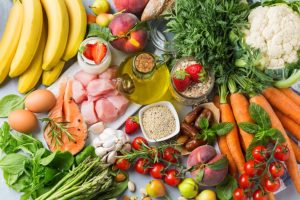 Unwanted side effects are the downside of blood pressure medication.
Unwanted side effects are the downside of blood pressure medication.
These potential known side effects are a major reason many patients put off taking blood pressure medications. They ignore their elevated readings and it can lead to trouble.
If you are concerned about your blood pressure but prefer not to take medications, we have some dietary suggestions to try first that may help control pressure levels naturally.
The standard recommendation is referred to as the DASH Diet. DASH stands for Dietary Approach to Stop Hypertension. This carefully crafted diet is rich in fruits, vegetables, whole grains, and low-fat dairy. It can help to reduce intake of saturated fats as well as cholesterol.
The DASH diet is recommended for short term or even lifelong use; however, this does not mean that followers of this diet have to completely eliminate all their favorite foods. As long as this is the basis for your way of eating it’s okay to treat yourself once in a while.
Patients with high blood pressure are almost always told to reduce sodium levels. Even a small reduction can have a big impact. It is generally recommended that people consume no more than 2,300 mg per day. For those 50 and older that number is reduced to 1500 mg per day. The same holds true for those with chronic kidney disease, diabetes, ongoing high blood pressure, and anyone who is of African descent.
Another hot topic when it comes to blood pressure reduction is alcohol. There is a balance when it comes to choosing to imbibe. A single serving of wine or other alcoholic beverage has actually been shown to reduce blood pressure. More than one drink, however, is considered potentially harmful. Blood pressure medications should be considered as well. Many medications can be negated by drinking or have side effects.
Changing your diet and lifestyle significantly is never an easy task. Below are some tips on how to make the dietary transition a smooth one:
- Track your progress – Get a notebook to use as a food diary. Keeping track of what and when you’re eating can help highlight issues you might not have been aware of.
- Ease into it – No one expects you to change your diet overnight and easing yourself into it may be the best option to ensure success.
- Shop Smart – Never go to the store hungry or without a list.
- Try salt substitutes – Herbs and spices can add wonderful flavor to your food without adding extra sodium.
- Bump up the potassium – Potassium can counteract the harmful effects of sodium and is found in supplemental form as well as in certain fruits and vegetables.
- Nix the fast food – These foods are loaded with chemicals and salt. They tend to aggravate hypertension.
The doctors at Tampa Cardiology offer blood pressure assistance as well as the advice of an onsite nutritionist. The most important thing to remember is that changing your diet and lifestyle is a gradual process and takes a lot of hard work, but the results of a longer life and healthier body and mind are always worth the effort.
Get started right away and schedule your appointment online at: WWW.TAMPACARDIO.COM. We are also reachable by calling the office at 813-975-2800.